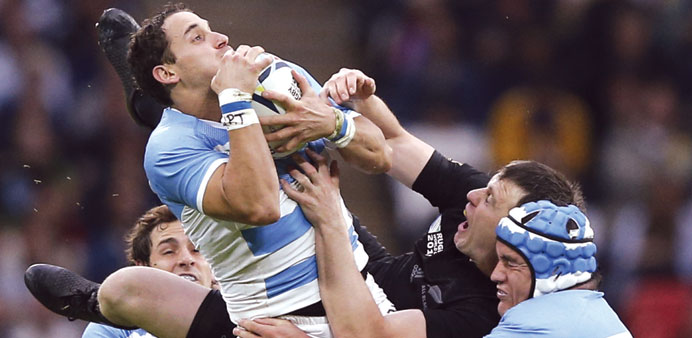Argentina’s full-back Joaquin Tuculet (L) grabs the ball next to New Zealand’s full-back Ben Smith (R) during a Pool C match of the Rugby World Cup at Wembley stadium in London. (AFP)
AFP/New York
The United States wants to emulate Argentina’s elevation to the elite rugby nations—only quicker, their assistant coach and European Cup winning prop Justin Fitzpatrick told AFP.
The Pumas are now part of the Southern Hemisphere Rugby Championship and have a franchise in the next Super Rugby club championship. The United States—who started the World Cup on Sunday with a 25-16 defeat by Samoa—are a long way off that, but Fitzpatrick believes it is getting closer.
“The Argentina route is our example, only I hope it doesn’t take us as long as it did them to get there,” said Fitzpatrick, who won 26 caps for Ireland and the 1999 European Cup with Ulster.
“Still they say those who pave the way make it easier for those following behind.”
The 41-year-old believes the one major vacuum in the United States rugby DNA will soon be fixed, namely a professional league.
“I believe that will be resolved by next year. There will be a professional league in the United States,” he said.
Fitzpatrick, who moved to the United States in 2013 and coaches a Seattle team, said there has been a dramatic change in American rugby.
“I went with the Ireland team in 2000 and we played in Manchester, New Hampshire, with a makeshift stand and 3,000 people watching,” said Fitzpatrick.
“A fortnight ago at an iconic stadium Soldier Field the USA played Australia, there were over 20,000 spectators and it was broadcast live.”
Australia beat the US Eagles 47-10 at the legendary Chicago Bears stadium.
Fitzpatrick, who had a successful spell in France with Castres before ending his career winning the Celtic League with Ulster, said qualifying for the World Cup and the Sevens side success in reaching next year’s Olympics had a galvanising effect on gaining new adherents. The United States will also host the 2018 Sevens World Cup in San Francisco.
“I think the biggest game changer is the inaugural Six Nations tournament in 2016 which is a very important addition,” he said.
The tournament will involve the Argentina Jaguars, the Pumas second team, Canada, Uruguay Chile and Brazil. Fitzpatrick said that another positive result of the growing popularity and profile of the sport in the States—there are two million active players—was that they were attracting top level athletes from other sports.
“There is a high level of dropping out of sports such as NFL and basketball and they are suddenly realising that it doesn’t mean the end of their sporting career,” he said.
“They see that there is a career path, through qualifying for the World Cup or playing sevens at the Olympîcs. Americans love winning medals and world titles and this presents an opportunity.
“As an example I have a former player from the Baltimore Ravens NFL side coming to join my club in the next few weeks.
“The level of player is getting better. I would say several of the players at my club would have made the Ulster side I played in.”
Nevertheless the challenges faced by the amateurs in the side (14 of the 31 players have professional contracts) is reflected by players such as hooker Zach Fenoglio, who combines being a chemistry teacher with playing for his country.
“I have to manage my time carefully. Teach during the day (at Regis Jesuit in Aurora, Colorado) then after that is done keep my competitive edge by doing some weights,” Fenoglio told AFP.
“When I go to training camps for the national team it sometimes takes me like many of the other guys six hours to get there.
“I’m lucky, though, I have a very supportive circle round me and it has been ace since I returned there as head rugby coach. The numbers playing have gone from 18 to filling four full teams.”

